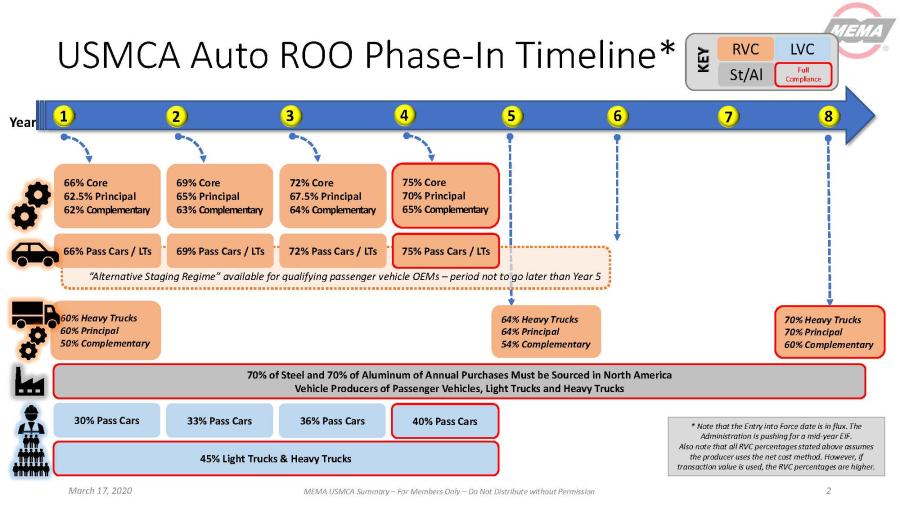USMCA
MEMA Staff Contacts:
Ann Wilson, Leigh Merino and Bill Frymoyer
Status:
Implementing the USMCA requires legislative and regulatory implementation actions.
April 2 and April 3 – Canada and Mexico notified the U.S. that they completed their respective ratification processes and are ready to implement the USMCA.
April 10 – Representatives Haley Stevens (D-Mich.), Jackie Walorski (R-Ind.), Terri Sewell (D-Ala.) and Jim Baird (R-Ind.) led an important and timely letter from 31 Members of Congress urging a delay in the USMCA entry into force of the complex auto rule of origin provisions. A press release announcing the letter followed. MEMA President and CEO Bill Long was quoted in the release.
April 20 – U.S. Customs and Border Protection (CBP) published interim implementing instructions, which serve as a guidance document. These may be updated at least once before the uniform regulations are issued.
April 24 – U.S. Trade Representative Robert Lighthizer notified the Congress that Canada and Mexico have taken measures necessary to comply with their commitments under the USMCA and that the Agreement will enter into force on July 1, 2020.
Next Steps:
The three parties will meet and discuss the uniform regulations, which govern the interpretation and application of the Agreement. The U.S. is expected to issue interim uniform regulations to address compliance with the automotive rules of origin (ROO).
The U.S. Department of Labor will issue regulations related to the high-wage components of the labor value content requirements.
Under the USMCA Implementing Bill, the uniform regulations implementing the automotive ROO must be issued on or before the date on which the USMCA enters into force. The U.S. will amend Title 19, Code of Federal Regulations (CFR) to implement the Agreement and the Act.
Background:
The most significant changes under the USMCA were related to the automotive specific ROO that overhauled the regional value content (RVC) requirements, created a matrix of parts categories, vehicle applications, and increased the RVC values. The new ROO also includes two new compliance requirements for vehicle producers – steel and aluminum requirements and labor value content requirement – both of which have implications for vehicle suppliers.
MEMA has created a slide deck that summarizes the USMCA Rules of Origin (view excerpt of timeline below). If you are a member of one or more of MEMA’s divisions (OESA, AASA, HDMA or MERA) and would like a copy of that reference material, please email your request to Leigh Merino.

History:
In August 2017, the United States began negotiations with Canada and Mexico to update and replace the current North American Free Trade Agreement (NAFTA). The parties conducted several negotiating rounds that culminated in a draft agreement just over a year later in October 2018. On November 30, 2018, the final text of the United States-Mexico-Canada Agreement (USMCA) was signed by President Donald Trump, President Enrique Peña Nieto and Prime Minister Justin Trudeau.
Throughout 2019, MEMA worked closely with the Office of the U.S. Trade Representative to better understand the rules of origin and the impact on vehicle suppliers and to establish common areas of understanding and positions on implementation. To view MEMA’s advocacy letters, comments and testimony related to USMCA, please click here.
Each Party is required to pass implementing legislation before the uniform regulations are presented and the agreement would enter into force.
UNITED STATES
MEMA’s one-pager on its advocacy efforts for USMCA “by the numbers” (view here)
On December 19, 2019, the U.S. House of Representatives voted on the USMCA implementing bill (H.R. 5430) passed 385-41 (view roll call vote here). On January 16, 2020, the U.S. Senate passed the bill 89-10 (view the roll call vote here). On January 29, 2020, President Trump signed it into law as Public Law No: 116-113.
CANADA
Both chambers of the Canadian Parliament voted on March 13, 2020 to adopt the agreement; it was then ratified. On April 2, 2020 Canada notified the U.S. and Mexico it finished its ratification process and is ready to implement the Agreement.
MEXICO
The Mexican Congress passed its USMCA legislation on June 20, 2019. On December 12, 2019, it quickly adopted the amendments to the USMCA. On April 3, 2020 Mexico notified the U.S. and Canada it is ready to implement the Agreement.
USMCA-Resources:
Executive Office of the President of the United States –
- Executive Order 13907; Establishment of the Interagency Environment Committee for Monitoring and Enforcement Under Section 811 of the USMCA Implementation Act
- Executive Order 13908; Establishment of the Interagency Committee on Trade in Automotive Goods Under Section 202A of the USMCA Implementation Act
Office of The U.S. Trade Representative –
- Agreement Text, Protocol and Side Letters United States-Mexico-Canada Agreement
- USMCA Fact Sheets
- USTR White Paper “Estimated Impact of [USMCA] on the U.S. Automotive Sector”
U.S. Congress –
- Congressional Research Service Report: “Proposed U.S.-Mexico-Canada (USMCA) Trade Agreement” (Dec. 2019)
U.S. International Trade Commission